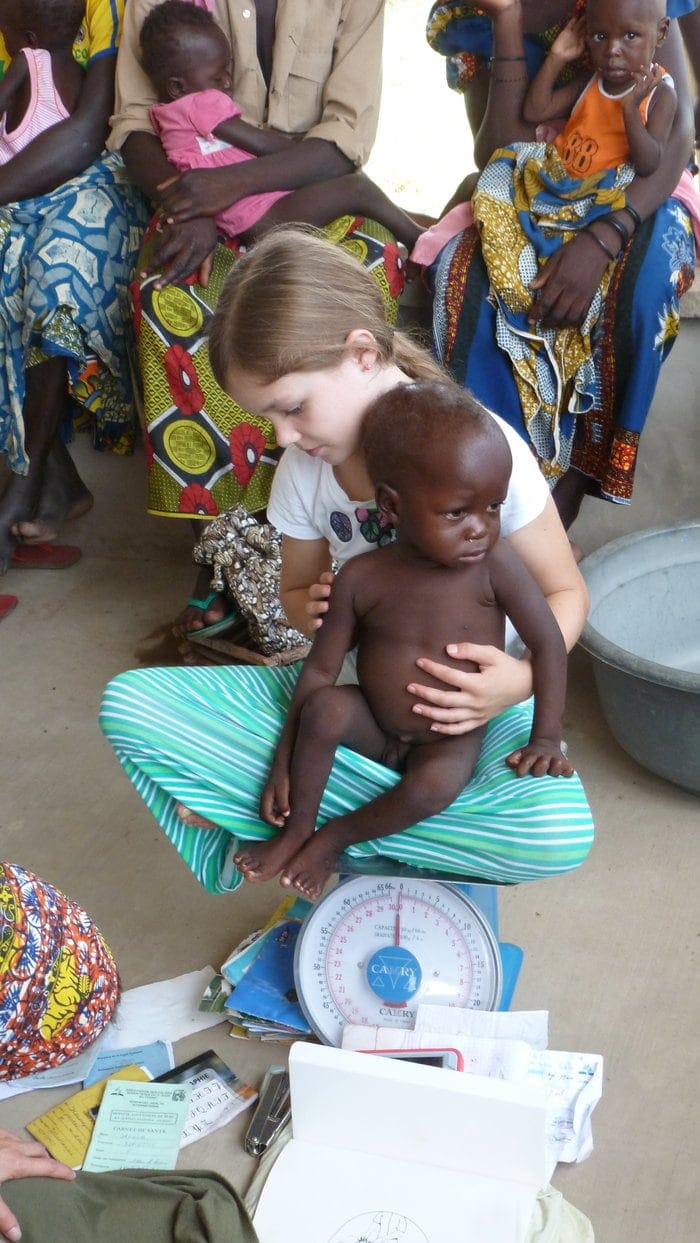
Three simple brick buildings opened as a memorial to the 4-year-old son of U.S. missionaries in a village in Chad.
In just six months, the Béré Adventist Nutrition Training Center has saved the lives of more than 50 malnourished children — and in the process opened the door to sharing the Adventist message in nearby villages.
Twice a week, the Nutrition Center, as it is known locally, provides parents of malnourished children with a daily milk formula and a multivitamin to supplement the children’s normal diet.
The children — typically between 6 months and 2 years old — are weighed and measured with the help of Phillip, a soft-spoken Chadian worker with a good-natured grin.

Then the center’s registered dietitian, Sarah Macomber, interviews the parents through an interpreter. Based on the child’s individual caloric needs, Macomber calculates a specific formula to give them each day for the coming week.
“It’s so clear that God is working here when we see babies gaining weight every week despite the difficult living conditions they face,” said Macomber, who moved to Chad from Centerville, Ohio, in November 2013 and is one of three U.S. missionaries running the center full-time.
The missionaries — who fill out their time by providing free health education, planting a market garden, and surviving day-to-day without electricity or home comforts — are seeking to meet the needs of a community where two in five children under the age of 5 suffer from chronic or severe acute malnutrition, a major problem that gives Chad one of the highest child mortality rates in the world. Many local families survive as subsistence farmers, relying on their harvest to carry them through a barren dry season until rain returns. Food availability often gets stretched to its limit.
One 8-year-old girl traveled more than 16 miles (30 kilometers) to enroll in the program at the center in Béré, a town of about 60,000 people located eight to 12 hours by car, depending on the season, from Chad’s capital, N’Djamena. Her weight was a meager 32 pounds (14.4 kilograms) when she arrived, and her father had to carry her because she did not have the strength to walk. After a week of treatment, she walked in on her own to get weighed.
“She gained 2 1/2 kilograms in one week!” Macomber said, thrilled about the 6-pound gain.
The center was originally created by Gary and Wendy Roberts as a memorial to their 4-year-old son, Kaleb, who died of malaria in 2009. They managed it until summer 2014 when, at the request of the General Conference, they moved to Indonesia. Mike Kelly and wife, Chris McClure, a couple from Tillamook, Oregon, entered as co-directors in September.
Since its official reopening in early October, the center has helped more than 200 mothers, and more than 50 children have graduated from the program after reaching a normal weight. Graduates receive a knit hat as a gift from donors in the United States.
Not all children manage to improve, however.
“Sometimes they just come too late, in spite of our best efforts,” said co-director Chris McClure, a specialist in early childhood development. “One family that lost a child was so thankful for the staff’s efforts they gave the center a chicken in appreciation.”
The center's influence has opened the door to the gospel in a nearby village. When the village chief’s daughter came to the center for help, there was no Adventist presence in her home village. Afterward, when a Bible worker went out to share with the village, many villagers were impressed by the care she had received and were ready to hear what he had to say. A congregation blossomed, and the district pastor is now preparing new members to form a full-fledged church.
Advertising for the nutrition program is mostly by word-of-mouth, but the center has started receiving referrals from local health centers. Community health workers trained by partner Project 21 have also brought in patients. Project 21 is a community health program in Chad run by two public health graduates from Loma Linda University.
The center operates on a budget of about $2 per day per baby, which falls between $800 per month during slow seasons and $2,000 per month at peak malaria periods. Funds come through donations to the staff’s home churches and Adventist Health International. Work has begun to create a market garden, which will help offset a portion of the costs.
While malnutrition is caused by a myriad of factors, one of the major barriers is often a lack of education. In addition to providing supplemental milk, the center maintains a high focus on training mothers in ways to tackle malnutrition before it gets to extreme levels. Mothers are given one-on-one attention to find economical ways to improve their family’s nutrition, such as using peanuts, moringa leaves, and other local foods rich in the vitamins and minerals that are often lacking in a rice-based diet.
The center hopes to start organizing seminars to become more effective in the community, said co-director Mike Kelly, a nurse with more than 40 years’ experience, including many in pediatrics.
“We want to start hosting seminars where mothers can learn more on a wide range of topics such as health, nutrition, transitional feeding, childhood development, and gardening,” he said.
Together with Project 21 and the nearby Béré Adventist Hospital, staff members have begun providing health education and health screenings in outlying villages though mobile clinics.
“We don’t want to wait until they come to us,” Kelly said. “We want to go to them like Jesus did,” Kelly said.
David Macomber is married to Sarah Macomber and works as a mission pilot for the various Adventist projects in Chad.